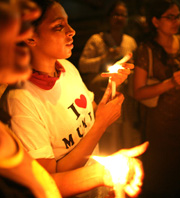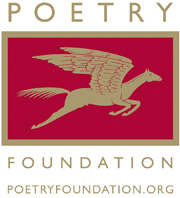Poetry Radio Project
Reflecting on Mumbai
Larissa Anderson
DECEMBER 6, 2008
- Reflecting on Mumbai
- (Uriel Sinai/Getty Images)
- View the Slideshow

- Poetry Foundation
- (www.poetryfoundation.org)
- View the Slideshow
Web Resources
- Vijay Seshadri
- Wislawa Szymborska
- Princeton University Press: "Sounds, Feelings, Thoughts: Seventy Poems by Wislawa Szymborska"
- Graywolf Press
- Poetry Foundation
Related Stories
- Conversations with America: Concluding the Conversation
- New Langston Hughes Poems Discovered
- Tuskegee Airmen
- Our First Inaugural Poet
Extra Audio
More From Larissa Anderson
On September 11, 2001, Indian American Poet Vijay Seshadri was in New York, standing on his roof, watching the buildings come down. When terrorists attacked Mumbai last week, Seshadri couldn't pull his eyes off the coverage. He says when he thinks about the violence in his native country or when he thinks about any terrorist attack or bombing, there's a poem that helps him get as close as he can to understanding it all.
---
Vijay Seshadri: It's a poem by Wislawa Szymborska, the Polish poet who's a Nobel laureate. One of the things that makes the poem powerful for me is it gives me an insight that's terrifying. If you listen to the poem and remember the images, they're all rendered from a certain perspective -- the point of view of the terrorist, and there's something horrifying about that when you realize it, that you are in the mind of the perpetrator of this act. There's a real restriction on the part of the poet about making any moral judgment.
---
The Terrorist, He Watches
by Wislawa Szymborska
The bomb will go off in the bar at one twenty p.m.
Now it's only one sixteen p.m.
Some will still have time to get in,
Some to get out.
The terrorist has already crossed to the other side of the street.
The distance protects him from any danger,
And what a sight for sore eyes:
A woman in a yellow jacket, she goes in.
A man in dark glasses, he comes out.
Guys in jeans, they are talking.
One seventeen and four seconds.
That shorter guy's really got it made, and gets on a scooter,
And that taller one, he goes in.
One seventeen and forty seconds.
That girl there, she's got a green ribbon in her hair.
Too bad that bus just cut her off.
One eighteen p.m.
The girl's not there any more.
Was she dumb enough to go in, or wasn't she?
That we'll see when they carry them out.
One nineteen p.m.
No one seems to be going in.
Instead a fat baldy's coming out.
Like he's looking for something in his pockets and
at one nineteen and fifty seconds
he goes back for those lousy gloves of his.
It's one twenty p.m.
The time, how it drags.
Should be any moment now.
Not yet.
Yes, this is it.
The bomb, it goes off.
(From "Sounds, Feelings, Thoughts: Seventy Poems by Wislawa Szymborska" with permission from Princeton University Press, Princeton, NJ. Copyright Wislawa Szymborska and English Copyright Princeton University Press.)
---
Vijay Seshadri: The Mumbai experience for me was just seeing that on TV, and I feel the reality of the situation much more clearly when I read a poem like this than upon hearing news accounts. The most striking thing was the fact that it was perpetuated over this period of time. First, I think I just said "Oh, another bombing." And then when I heard about what had happened in the Chabad house, when I heard about luxury hotels that were taken over, when I had these images in my mind of people coming in little boats, there was a strange sort of intimacy and you had time to think about what people were feeling. You had time to reflect on the ways in which you yourself would respond. I didn't see this as happening to other people, I saw this as happening to people who were my people.
I wrote a poem in the year after 9/11 titled "Survivor." It's a poem about the guilt of the people who survive. It's not a poem of solidarity with suffering, as this Szymborska poem isn't a poem of solidarity. I think both poems are antisocial responses to suffering in some way.
---
Survivor
by Vijay Seshadri
We hold it against you that you survived.
People better than you are dead,
but you still punch the clock.
Your body has wizened but has not bled
its substance out on the killing floor
or flatlined in intensive care
or vanished after school
or stepped off the ledge in despair.
Of all those you started with,
only you are still around;
only you have not been listed with
the defeated and the drowned.
So how could you ever win our respect?--
you, who had the sense to duck,
you, with your strength almost intact
and all your good luck.
(Copyright 2004 by Vijay Seshadri. Reprinted from "The Long Meadow" with permission from Graywolf Press, St. Paul, MN.)
-
- Music Bridge:
- Thelema
- Artist: Jozef Van Wissem
- CD: A Priori (Phantom Sound & Vision)







Comments
Comment | Refresh
Post a Comment: Please be civil, brief and relevant.
Email addresses are never displayed, but they are required to confirm your comments. All comments are moderated. Weekend America reserves the right to edit any comments on this site and to read them on the air if they are extra-interesting. Please read the Comment Guidelines before posting.
You must be 13 or over to submit information to American Public Media. The information entered into this form will not be used to send unsolicited email and will not be sold to a third party. For more information see Terms and Conditions and Privacy Policy.